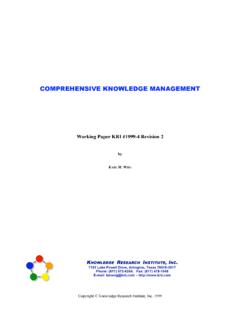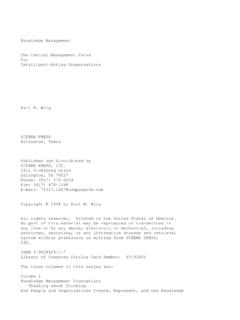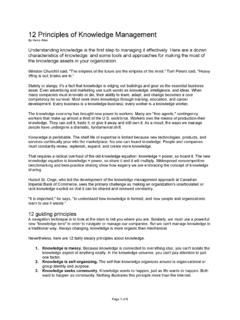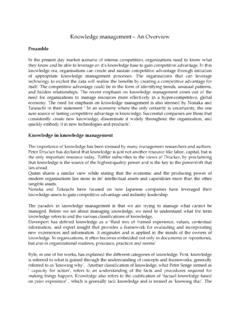Transcription of Knowledge Management: An Emerging Discipline …
1 Knowledge Management: An Emerging Discipline Rooted in a Long HistoryKarl M. WiigKnowledge Research Institute, Inc. of Chapter 1 inKnowledge ManagementEdited by Daniele Chauvel & Charles DespresScheduled for publication Fall, of Knowledge ManagementIntellectual Roots of Knowledge ManagementDifferent Brands of Knowledge ManagementKnowledge and Information: The Need for Crisp DefinitionsDriving Forces behind Knowledge ManagementExternal Driving ForcesInternal Driving ForcesOngoing DevelopmentsWhat Is New?What May Lie ahead for Knowledge management ?The Changing WorkplaceTowards a Knowledge management DisciplineConcluding PerspectivesReferencesNotesKnowledge Management: An Emerging Discipline Rooted in a Long HistoryKarl M. WiigKnowledge Research Institute, Inc.
2 Business direction we call Knowledge management (KM) has emerged overthe last decades as a result of many intellectual, societal, and business of its roots extend back for millennia, both in the West and the East, whileothers, particularly those associated with Cognitive and Information sciences,are quite recent. Globalization of business also plays an important role. WhereasKM has become a valuable business tool, its complexity is often vexing, and as afield, will still be under development for a long time to come. Significant changesin the workplace have already taken place, but changes to come are expected tobe greater. As for other management directions, it is expected that KM will beintegrated into the basket of effective management tools, and hence disappear asa separate , what it is, what it means,and its roles for work and spiritual life, hasa long history.
3 The abstract considerationsand speculations by philosophers and re-ligious thinkers have been of particularsignificance. In addition, the emphasis onknowledge has always had a practical work-related and secular side. It is this aspect wepursue in this in the workplace the abilityof people and organizations to understandand act effectively has regularly beenmanaged by managers, coworkers, and pro-active individuals. Those responsible forsurvival in competitive environments al-ways have worked to build the best possibleknowledge within their area of , and other IC components,serve two vital functions within the They form the fundamental re-sources for effective functioning and pro-vide valuable assets for sale or business perspectives, explicit andsystematic Knowledge management has notbeen of general concern until recently, andas a result, availability of competitive ex-pertise has been haphazard.
4 This is we improve KM and as our competi-tors improve we must continue to developof our KM practices. These efforts, whichbecome increasingly sophisticated and de-manding, must build upon the historic rootsof Knowledge -related considerations. In ad-dition we must pay attention to develop-ments in technology and people-centric ar-eas like cognitive sciences. In other words,we must rediscover the power of pastthinking as well as understand opportuni-ties that lie ahead. 1 See for example Stewart (1997) and Sveiby (1997). Knowledge management : An Emerging Discipline Rooted in a Long History2 History of Knowledge manage -mentA historical perspective of today s KM,indicates that this is an old quest.
5 Knowl-edge, including knowing and reasons forknowing, were documented by Westernphilosophers for millennia, and with littledoubt, long before that. Eastern philoso-phers have an equally long documentedtradition of emphasizing Knowledge andunderstanding for conducting spiritual andsecular life. Much of these efforts were di-rected to obtain theoretical and abstractunderstandings of what Knowledge needs to know or particularly,needs for expertise and operational under-standing have been important since thebattle for survival first started, perhaps be-fore the first human. Managing practicalknowledge was implicit and unsystematicat first, and often still is!
6 However, thecraft-guilds and apprentice-journeyman-master systems of the 13th century, werebased on systematic and pragmatic KMconsiderations. Still, the practical concernsfor Knowledge and the theoretical and ab-stract epistemological and religious per-spectives were not integrated then, and stillare mostly kept present focus on Knowledge , par-ticularly for KM, is often explicitly orientedtowards commercial effectiveness. However,there are Emerging realizations that toachieve the level of effective behavior re-quired for competitive excellence, the whole 2 The epistemological considerations of the Greek philoso-phers Socrates, Plato, and Aristotle are well known.
7 Perhapsless known in the West are the teachings of Lao Tzu andConfucius in China, also about 2,500 years ago. Indian phi-losophers also pursued similar must be considered. We must inte-grate cognition, motivation, personal satis-faction, feeling of security, and many present KM focus is not driven bycommercial pressures alone. A practical,often implicit, aspect of KM is that effectivepeople behavior required for success restson delegating intellectual tasks andauthority to knowledgeable and empoweredindividuals. KM also represents an evolu-tion of the move towards personal and in-tellectual freedom that started with the ageof enlightenment and reason over 200 yearsago.
8 One notion was that through propereducation, humanity itself could be altered,its nature changed for the better. As othersocial movements, this has taken a longtime to penetrate, particularly into the con-servative ranks and practices of emergence of the explicit knowledgefocus and the introduction of the term KM in the 1980s was no accident and did nothappen by Although it happenedgradually and often was met with manage - ment uncertainty, it was a natural evolu-tion brought about by the confluence ofmany factors. The developments that haveled to our present perspectives on KM comefrom many areas. Some are intellectually 3 See for example Boulding (1966), Cleveland (1985),Drucker (1988), Stewart (1991), and Sveiby & Lloyd (1987).
9 4 Managers, by necessity have been conservative. manage - ment is not a science, and approaches to control the social,open systems of human and economic behavior in organiza-tions and markets are fraught with problems and uncertainty(see Austin, 1996 and Hilmer & Donaldson, 1996). Success-ful management approaches, therefore, are built on traditionsand long A perspective of the history of KM can for example befound in Wiig (1997). Knowledge management : An Emerging Discipline Rooted in a Long History3based, others are pragmatic and rooted inthe need to innovate to secure real life our present-day perspective, inspite of increasing advances in thinking,there were little change in needs for practi-cal KM until the industrial revolutionchanged the economic landscape in the 17thcentury.
10 The introduction of factories andthe related systematic specialization be-came more pronounced to support the abil-ity to create and deliver goods in greaterquantities and at lower costs. Still, KM wasimplicit and largely based on the appren-tice-journeyman-master model. Schools anduniversities mostly fulfilled a tacit missionto provide education as required for aleading minority. To some extent, this tacitperspective survives to this day. Education,be it primary, secondary, or higher, is per-ceived to be good and of general value, of-ten with less thought given to which knowl-edge must be developed for which Roots of KnowledgeManagementIntellectually, broad, present-day KMhas many origins.











